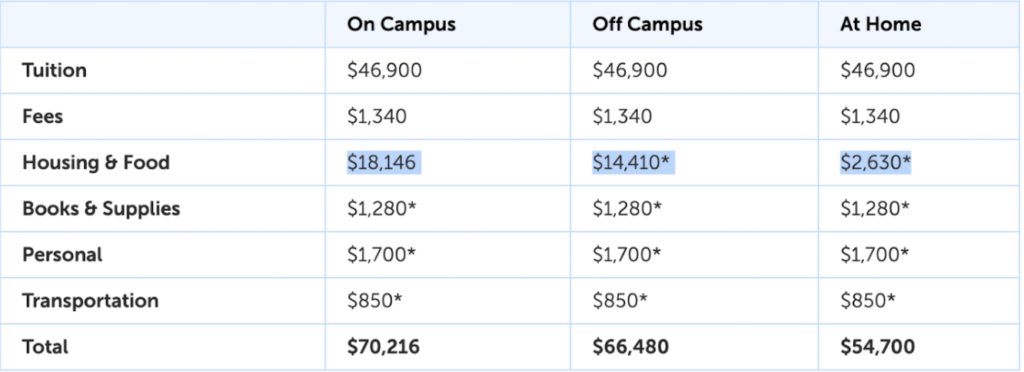Statistically speaking, there is one positive to commuting to college–saving money. This post is going to reinforce your decision to commute, because it is a smart one. While it may sometimes not feel worth it, commuting from home will save you thousands in the long run.
For this post, I have done some research on local dorm and apartment costs. I will be focusing on Boston. According to the Boston University International Students & Scholars Office (ISSO) resource page, there are an estimated 250,000 students in Boston. Despite being home to many students, the prices are far from college kid friendly.
Dorm Costs
Many college students reside on campus in the school affiliated housing. Dorms are usually small rooms where students live with roommates. Despite living communally and sharing facilities, the prices tend to be astronomically high.
I have elected to look into four Boston colleges and universities housing costs. While it is only a small percentage of the colleges in Boston, I believe it will be representative of most housing costs, as between the four there is only a slight discrepancy.
The four colleges I looked into are:
- Emerson College
- Boston University
- Suffolk University
- Simmons University
The colleges/universities are all located in different areas of Boston. I pinned each location on the map to depict their distance.

Emerson College
My college is located near Downtown Boston, Chinatown, and the theater district. Located right in front of the Boston Commons, the school is in the heart of Boston. Housing is expensive; the college website provides an estimate of $21,652 for a year of housing for a standard double. This estimate includes housing and a meal plan.
I lived in the dorms my freshman year. Emerson College guarantees housing and ‘requires’ all students to live on campus for three years. If you decide to commute or live off campus you must fill out a form relinquishing your right to guaranteed housing.
My freshman year I lived in Little Building, the freshman only dorm. I was extremely lucky with my housing assignment as I was given a suite. It was equipped with a bathroom and the rooms were large. However, most people are not lucky and are placed in small rooms without bathrooms.
Little Building is particularly unique as there are lightwell dorms. These dorms are small and have one window that does not go directly outside. The architecture of the building creates a column where dorms face other dorms. Natural lighting is sparse in these dorms only coming from the open gap above. If the window blinds are left open other people can see into your room. It is definitely not worth the high cost for people stuck in lightwell dorms.
Well I have no experience with the dorm conditions in surrounding Boston colleges, I will be listing their prices for reference.
Suffolk University
This university is the most expensive on this short list of colleges, with the official Suffolk website estimating room and board to cost students $22,782. This is the price for a standard double, without a kitchen, and the required plan C meal plan.
Boston University
Boston University has many different types of housing. However to live in a standard dorm (either a double, triple, or quad) it costs $19,970 according to their housing cost breakdown.
Simmons University
Simmons University provides a breakdown of estimated student costs on their website. To live on campus it costs an estimated $18,146.

A chart created by Simmons University breaking down the estimated costs of attending university
Highlighted are the room/board costs
Again, this chart emphasizes the amount that commuters save by living at home. While the off campus and at home numbers vary from student to student, the at home is drastically different.
Apartment Living
Dorming is not the only option for college students. Many colleges don’t guarantee housing for all four years, therefore most people need to live off campus at some point.
Apartments in the city are small and costly. According to Apartments.com Boston is 115% more expensive than the rest of the country’s rent. Apartments range in cost, so sometimes you can get lucky. But even if you win the Boston lottery and find an apartment with a few roommates that will cost you $1,000, you still will be spending $12,000 for a one year lease. This doesn’t include utilities.
I decided to do a quick search on apartments. Using Apartments.com I found a few options. First I decided to use Emerson College as a marker. For anything remotely close to campus you will be paying at least $2,000, if you plan on living by yourself. I found one apartment slightly farther away, but still walkable, with a roommate the rent would be a reasonable $1,500. This apartment only includes a water utility.
Across the many apartments I searched the average rent seems to be around $1,500. Therefore you will be likely spending an estimated $18,000 to $24,000 yearly for a small apartment that might not include utilities.
The farther out of the city you go, prices get more reasonable. However, from my own experience looking into apartment living over the past few years, Massachusetts is expensive, even outside of Boston. Not only will you still be spending a decent amount of money, but the farther you go from campus, even in places where you can take the MBTA, you will have to factor this commute into your schedule.
Living at Home
Living from home and commuting to school undeniably saves you money. According to the Simmons University estimated costs it will save approximately anywhere from $11,000 to $15,000 dollars. If you do it for multiple years, that adds up to a lot of money, quick.
College is already so expensive. Tuition prices require most students to take out loans, putting themselves into debt. If students can save any money in the four years of undergrad, logically they should.

By Isabel DeSisto
Isabel DeSisto is a senior majoring in Writing, Literature, and Publishing at Emerson College. She is an avid traveler and is always looking to go on a trip. While adventurous, there is nothing she enjoys more than hanging out with her dogs and reading a book.
For over 25 years, the Campus Clipper has helped college students in New York City—and later in Boston and Philadelphia—save money and succeed in city life. We offer a digital coupon booklet with discounts on food, clothing, and services, plus an Official Student Guidebook with real advice on how to navigate college life in a big city. Our internship program lets students build skills, earn money, and publish their own e-books. Follow us on Instagram and TikTok @CampusClipper, and sign up for our newsletter to get deals straight to your inbox. To access the digital coupons, scan the QR code on our printed card—available in dorms, student centers, and around campus.

